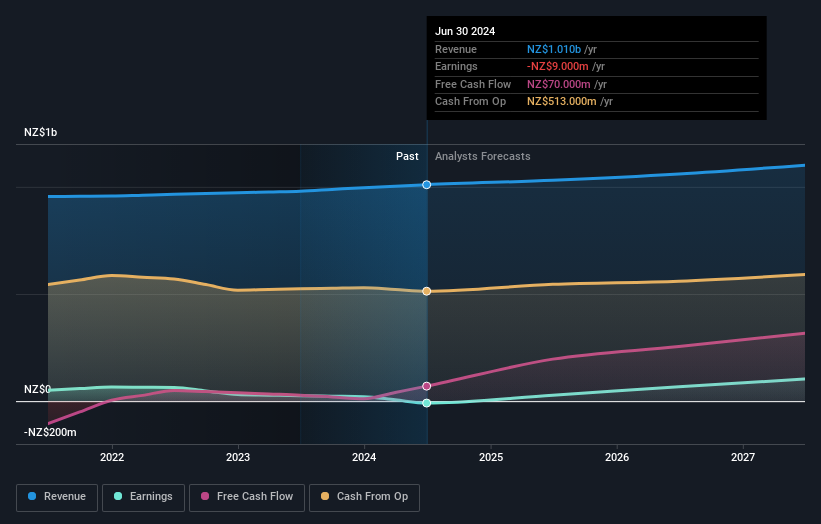- New Zealand
- /
- Telecom Services and Carriers
- /
- NZSE:CNU
Chorus Limited Just Reported A Surprise Loss: Here's What Analysts Think Will Happen Next

It's been a good week for Chorus Limited (NZSE:CNU) shareholders, because the company has just released its latest full-year results, and the shares gained 6.0% to NZ$8.59. Revenues came in at NZ$1.0b, in line with estimates, while Chorus reported a statutory loss of NZ$0.02 per share, well short of prior analyst forecasts for a profit. This is an important time for investors, as they can track a company's performance in its report, look at what experts are forecasting for next year, and see if there has been any change to expectations for the business. So we gathered the latest post-earnings forecasts to see what estimates suggest is in store for next year.
See our latest analysis for Chorus

Taking into account the latest results, the current consensus from Chorus' seven analysts is for revenues of NZ$1.03b in 2025. This would reflect a credible 2.1% increase on its revenue over the past 12 months. Chorus is also expected to turn profitable, with statutory earnings of NZ$0.06 per share. Yet prior to the latest earnings, the analysts had been anticipated revenues of NZ$1.03b and earnings per share (EPS) of NZ$0.069 in 2025. The analysts seem to have become more bearish following the latest results. While there were no changes to revenue forecasts, there was a real cut to EPS estimates.
The consensus price target held steady at NZ$7.78, with the analysts seemingly voting that their lower forecast earnings are not expected to lead to a lower stock price in the foreseeable future. The consensus price target is just an average of individual analyst targets, so - it could be handy to see how wide the range of underlying estimates is. There are some variant perceptions on Chorus, with the most bullish analyst valuing it at NZ$8.80 and the most bearish at NZ$5.32 per share. As you can see, analysts are not all in agreement on the stock's future, but the range of estimates is still reasonably narrow, which could suggest that the outcome is not totally unpredictable.
Taking a look at the bigger picture now, one of the ways we can understand these forecasts is to see how they compare to both past performance and industry growth estimates. The analysts are definitely expecting Chorus' growth to accelerate, with the forecast 2.1% annualised growth to the end of 2025 ranking favourably alongside historical growth of 0.8% per annum over the past five years. By contrast, our data suggests that other companies (with analyst coverage) in a similar industry are forecast to grow their revenue at 3.3% per year. So it's clear that despite the acceleration in growth, Chorus is expected to grow meaningfully slower than the industry average.
The Bottom Line
The biggest concern is that the analysts reduced their earnings per share estimates, suggesting business headwinds could lay ahead for Chorus. On the plus side, there were no major changes to revenue estimates; although forecasts imply they will perform worse than the wider industry. There was no real change to the consensus price target, suggesting that the intrinsic value of the business has not undergone any major changes with the latest estimates.
Keeping that in mind, we still think that the longer term trajectory of the business is much more important for investors to consider. At Simply Wall St, we have a full range of analyst estimates for Chorus going out to 2027, and you can see them free on our platform here..
You should always think about risks though. Case in point, we've spotted 2 warning signs for Chorus you should be aware of.
New: AI Stock Screener & Alerts
Our new AI Stock Screener scans the market every day to uncover opportunities.
• Dividend Powerhouses (3%+ Yield)
• Undervalued Small Caps with Insider Buying
• High growth Tech and AI Companies
Or build your own from over 50 metrics.
Have feedback on this article? Concerned about the content? Get in touch with us directly. Alternatively, email editorial-team (at) simplywallst.com.
This article by Simply Wall St is general in nature. We provide commentary based on historical data and analyst forecasts only using an unbiased methodology and our articles are not intended to be financial advice. It does not constitute a recommendation to buy or sell any stock, and does not take account of your objectives, or your financial situation. We aim to bring you long-term focused analysis driven by fundamental data. Note that our analysis may not factor in the latest price-sensitive company announcements or qualitative material. Simply Wall St has no position in any stocks mentioned.
About NZSE:CNU
Chorus
Engages in the provision of fixed line communications infrastructure services in New Zealand.
Reasonable growth potential and fair value.
Market Insights
Community Narratives




